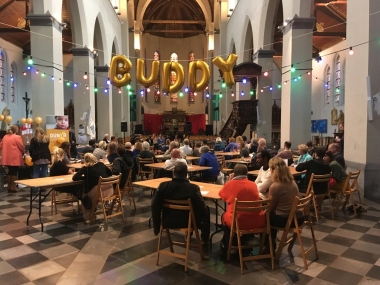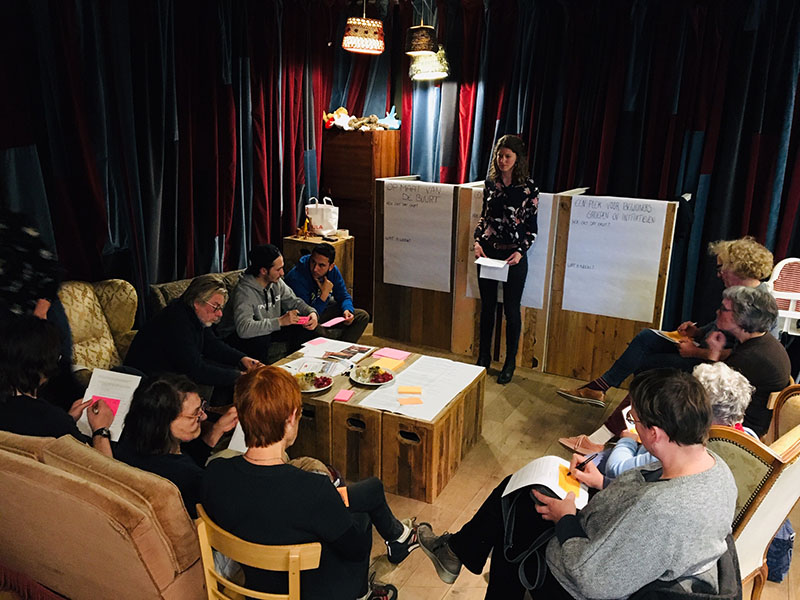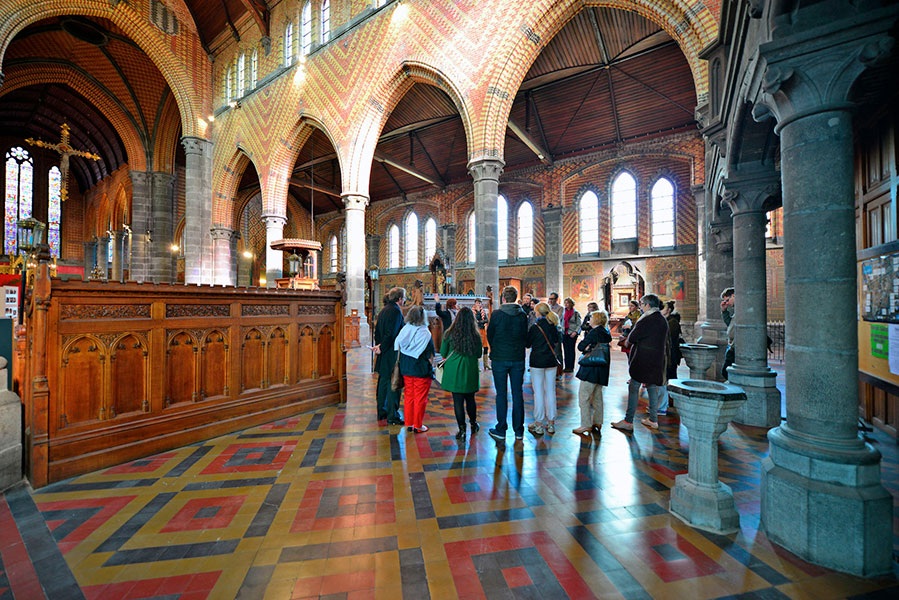Establishing connections in intermediate spaces: Policy participation in Ghent
Edited on
13 November 2020How the Belgian city is planning a more liveable and sociable urban future

Civic eState Transfer Network aims at transferring and further developing new policy tools experimented by the City of Naples to regenerate abandoned and/or deprived buildings, therefore subtracted to the use of city inhabitants. In this sense, Ghent, Civic eState’s city partner, does not have one uniform regulatory framework to support citizen initiatives right now, but it has a long tradition in participative approaches: already in the 90ties, the City created a unit that enables policymakers to integrate a bottom-up approach in planning and decision making processes. The unit still exists and has developed different instruments – a participation platform, a crowdfunding platform, temporary use of vacant buildings, participatory budget, neighbourhood management projects, … – to enable and support citizens’ ideas and initiatives.
Policy participation in Ghent works on three levels:
- micro: neighbourhood
- macro: city
- meso: broader than a neighbourhood or between neighbourhoods
In order to connect with citizens and with society, neighbourhood managers (civil servants of the Participation Unit) are building networks in the 25 districts of the city. They deliver tailored work to create more livable, more social and more sustainable districts. They are the go-between between various stakeholders to find solutions to urban challenges existing in the neighbourhood. Neighbourhood managers are the link between the city council and the city’s residents, establishing the necessary contact between policy topics and different stakeholders based on a helicopter view inside and outside the city.
On a macro level, there is a City-wide action which receives input from and provides input to neighbourhood management. It aims to fuel participation and co-creation of projects with a supralocal character, more than merely search for territorial impact. Some examples of this approach are citizens’ cabinet, temporary use, a crowdfunding platform, the Ghent Canal Zone project and the “Room for Ghent” project. Consequently, on a “meso” level the City of Ghent empathizes on projects with a strong spatial link and focuses on the introduction of a people-oriented approach within ‘systemic’ fields, establishing links between different neighbourhoods
Differents identifications and monitoring tools are been used to listen to people to people's concerns, such as:
- Neighbourhood of the Month;
- sounding board groups & think tanks;
- a participation platform;
- think tanks with long-term participation projects (En Route, "Room for Ghent", citizens' cabinet);
- SWOT analysis and monitoring table for indications (neighbourhood analysis, recording and following up on indications);
- detection of indications by means of stories (testimonies).
The City of Ghent has also been experimenting with temporary use of brownfield sites and empty buildings for over a decade. Often, this happens in response to urban renewal projects. With the urban renewal, the period between the development and implementation of the plans is usually very long. Therefore the City of Ghent stimulates its residents to use the sites and buildings in the interim. This brings a new dynamic to neighbourhoods and offers added value for the city’s development. DE SITE, the first iconic temporary use, started 10 years ago: allotments, a greenhouse, two urban horticultural plots, a football field, a bike playground and an urban farmstead with 8 chickens were created on the site of the former Alcatel Bell factory in the district of Rabot. The residents rolled up their sleeves and helped to reshape their neighbourhood. The City of Ghent provides subsidies to initiators of temporary use projects via the Temporary Use Fund. This Temporary Use Fund helps new initiatives to get started. Every year, the city council makes a budget of €300,000 available for this purpose. A lot of new temporary initiatives (25) occurred thanks to this Fund. The City gives (cheaper) space to new ideas, projects, and social entrepreneurship of citizens.
The “Commons Transition Plan”
In 2017, the City invested resources in the development of a policy to provide guidelines for commons governance in the City, the “Commons Transition Plan”. The plan’s recommendations, describing the possibilities and the role of the city in reinforcing citizen initiatives became the base of the Commons Transition Plan. The Plan was discussed and co-written by a local group of 200 commoners and city departments. With this plan, the City wishes to give further shape to a sustainable and ethical economy in Ghent. This writing and participation process was guided by a steering committee (consisting of several citizen initiatives and civil servants) and wants to steer a learning network of knowledge development and exchange.

Ghent's ULG session, 2019
This learning network is one part of the Urbact Local Group, we call it the city-wide ULG.
To know more about the “Commons Transition Plan”, we refer to these insights:
A Commons Transition Plan, by Michel Bauwens, a presentation of Commons Transition Plan by its Head of Research, Michel Bauwens, on the Plan’s official website;
A 'Commons Transition Plan' for Ghent, the official documents in the English language from the website of the City of Ghent;
Urban commons initiatives in the city of Ghent: a Commons Transition Plan by Bauwens, article by LabGov, an international network of researchers on commons and collaborator of Civic eState, which analyzes and presents the main points of the report on Ghent Commons Transition Plan’s executive summary.
Ghent’s asset: Saint Jozef Church
The Saint Jozef Church is located in the very heart of the Rabot district and it has a central position in the main commercial street Wondelgemstraat. With the diminishing number of parishioners, the parish decided to close the church for religious activities.
In 2018 the slot conference of the URBACT project Refill concerning the temporary use of vacant spaces took place in the beautiful Saint Jozef Church in Ghent. At that time, the City was planning on buying this church and ‘giving it back’ to the neighbourhood citizens. After the positive experience in the Refill project, the City decided to participate in the URBACT project Civic eState, concerning the co-management by the city and its citizens of city assets and chose the Saint Jozef Church as the main pilot project.

The Civic eState Team visiting Saint Josef Church during the 2nd transnational thematic meeting “Urban Social Infrastructures” held in Ghent, May 27 - 28, 2019
In March 2019, the city bought the building, in order to return it to the people of the neighbourhood. The management of the building will be given to an external party which will be selected by a jury after replying to an open call. The assignment of the administrator will be threefold:
- Find users for the building. Designing a neighbourhood-oriented, socio-economical program that allows accessible meetings, flexible neighbourhood coalitions and stimulates people to take up a more active role. An open space that gives residents the opportunity to develop a social network based on their own needs and possibilities and to be guided towards work and entrepreneurship.
- Manage the building.
- Provide a good management system and a business model.
The administrator/manager to be found via open call will have to come with a plan that is community-oriented and that takes into account the specific needs of the diverse and colourful neighbourhood it is located in. Exchanges with other cities helps Ghent to think about how we could find a good manager in an open, participative way. Now, Ghent is learning from cities like Barcelona, Amsterdam, Gdansk on how to enhance its own city policies in this regard. It has some principles in common with these cities, like sustainability and inclusivity, and because of this, they learn from each other on these topics much more.
All URBACT projects follow a certain methodology. Following this methodology, Ghent brought together the commoners, citizens, organisations from the neighbourhood to form the Urbact Local Group (ULG). This group is actively involved in the project. The Ghent team also created a cross-departmental task force within the city administration to work on the project. This task force works really well, so well that they would like to keep it in place after the project has ended.
Along the way, they stumbled upon several problems concerning the pilot project. There were issues with fire safety, Covid-19 came and they also had to deal with financial uncertainty. All this made it impossible to launch the open call in spring 2020. But the Ghent Team didn't let heads down: pending the process of the launch of the open call, they are going to put the church in a city tool called “room finder”. It means that up to 12 times a year, citizens will be able to use the church. A perk of using this tool is that the insurance issue is covered. In springtime 2021, they will launch the open call for a manager.
 Submitted by Gregorio Turolla on
Submitted by Gregorio Turolla on
